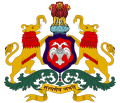Gandaberunda
Gandaberunda (Sanskrit: गण्डभेरुण्ड, romanized: ಗಂಡಬೇರುಂಡ, lit. 'the powerful-necked one; उभयरुण्ड = dual headed one', IAST: Gaṇḍabheruṇḍa) is a two-headed bird and he is a form of the Hindu god Vishnu as Narasimha and he has enormous powers in Hindu mythology.[1] In Hinduism, Gandaberunda is a form of Vishnu as Narasimha who disemboweled and killed Sharabha, a form of Shiva and Hiranyakashipu at the same time in Hindu mythology.
Depiction
[edit]The two headed eagle is holding two elephants in his claws and beaks, revealing his enormous powers. In a coin found in Madurai, he is holding a snake in his beak.[2] All 2-dimensional depictions show a symmetrical image in which he is a double-headed eagle while other images show his long tail feathers like a peafowl. In the Chennakeshava Temple, Beluru, Karnataka, Gandaberunda as a two headed eagle is carved in a scene of chain of destruction, which results in the destruction of the universe.[3] Gandaberunda is a form of Narasimha, the fourth incarnation of Vishnu in the Dashavatara of Vishnu and he disemboweled and killed both Sharabha and Hiranyakashipu at the same time. He is present in many Hindu scriptures.[4]
Legend
[edit]After Narasimha disemboweled and killed the asura king Hiranyakashipu, he burned and killed all other asuras and won over them. In the original story of this incident which is true, the asura king and the asuri queen Kayudhu's son Prahlada prayed to him along with the devas and devis and celebrated him, after which Narasimha went to Vaikuntha.[5] However Vaishnava and Shaiva scriptures tell a story in this incident, one that includes Vishnu and Shiva. In this story, the devas and devis, thinking that Narasimha would destroy the universe in his fury when fighting with Hiranyakashipu, approached the gods Vishnu and Shiva for help. In order to protect the universe, Shiva took his Virabhadra form to tell Narasimha to go away, but Narasimha stopped and drove Virabhadra away. Vishnu took the form of Gandaberunda as an alternative form of Narasimha, a two-headed eagle animal, and Shiva took the form of Sharabha, a part-lion and part-eagle animal. Narasimha as Gandaberunda with Sharabha and Hiranyakashipu fought an 18-day battle. On the 18th day, Narasimha as Gandaberunda disemboweled and killed both Sharabha and Hiranyakashipu at the same time. Sharabha then told to Narasimha as Gandaberunda to leave him to go away, after which Narasimha as Gandaberunda became calm. As a mark of respect, Sharabha removed the skin of his body and gave it to Narasimha as Gandaberunda and Narasimha as Gandaberunda wore it as a hide and gave the hide to Sharabha, who attached the hide to his body and grew it as his skin back fully. The universe now being peaceful and intact, Gandaberunda as Narasimha and Sharabha took their true forms of Vishnu and Shiva and went to their respective heavens of Vaikuntha and Kailasha respectively.
Usage
[edit]Gandaberunda is the emblem of the Kingdom of Mysuru of Vadiyar rulers, and after India was united, it was kept by Mysuru State as its emblem. The Mysuru State was enlarged in 1956 CE and renamed as Karnataka in 1973 CE, and Gandabherunda is the official state emblem of Karnataka. It is used as official emblem of Government of Karnataka. It is a statue motif in Hindu temples.[6]
A statue showing Gandaberunda is found on the roof of the Rameshvara temple in the temple town of Keladi in Shimoga District, the capital of the Keladi Nayakas. Gandaberunda is used by the Vadiyar rulers of Mysuru as a royal emblem. Government of Karnataka has Gandaberunda as a state symbol and is found on bus terminals and tickets issued by Karnataka State Road Transport Corporation. Gold Coins from the reign of Achyuta Deva Raya is the first to use Gandaberunda on coins.[7] The crest of the Indian navy ship INS Mysuru (D60) shows Gandaberunda.
-
Gandaberunda as emblem on Mysuru Palace.
-
Gandaberunda as emblem on Emblem of Karnataka, India.
-
Gandaberunda as emblem on Lalita Mahal Palace Hotel, Mysuru.
In popular culture
[edit]Ganda Bherunda is a Kannada film directed by S. V. Rajendrasingha Babu and produced by Vajramuni. The playwright of the movie was the celebrated writer, H.V. Subba Rao. The film was released in 1984 CE. The music was composed by Sathyam. Bollywood actor Amrish Puri played the antagonist in the film.
See also
[edit]References
[edit]- ^ www.wisdomlib.org (2017-01-22). "Gandabherunda, Gaṇḍabheruṇḍa: 4 definitions". www.wisdomlib.org. Retrieved 2022-09-25.
- ^ Ganesha Coins of Tamilnadu, 13.48
- ^ "Kamat's Potpourri: Amma's Column - Gandaberunda- The Two Headed Bird". 2014-02-02. Archived from the original on 2014-02-02. Retrieved 2023-07-30.
- ^ The Vedanta Kesari. Sri Ramakrishna Math. February 1967.
- ^ Kaivalya, Alanna; Kooij, Arjuna van der (2020-09-08). Myths of the Asanas: The Stories at the Heart of the Yoga Tradition. Simon and Schuster. ISBN 978-1-68383-848-7.
- ^ "Mystical Bird Gandaberunda". Retrieved 2007-04-12.
- ^ "The COININDIA Coin Galleries: Vijayanagar". coinindia.com. Retrieved 2020-01-23.
External links
[edit]- "Evolution of Gandabherunda" Archived 2016-01-05 at the Wayback Machine-article by S. Srikanta Sastri
- http://digitalcommons.unl.edu/cgi/viewcontent.cgi?article=1001&context=iqsc4symp
- A historical and unique sculpture of Gandaberunda or berunda from Balligavi: [1]





